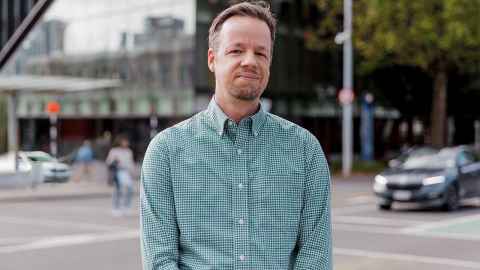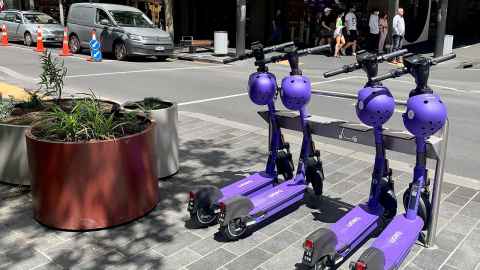Project funded to trial ‘bike or scoot and ride’ at Panmure station
7 November 2022
Researchers at the School of Architecture and Planning have received Waka Kotahi Innovation funding for a project that aims to make it easy for commuters to, rather than park and ride, scoot or bike and ride.

Park and Ride facilities were not so long ago considered an innovative and sustainable travel option, allowing those living in the outer suburbs of a city to connect with public transport.
They have become popular, but too popular; the parking lots are always full, commuters trying to get into them are causing traffic jams in surrounding areas, and it’s increasingly recognised that the valuable land currently used for such large carparks could be put to better use.
“Car trips to and from public transport are among the highest polluting vehicle trips,” says principal investigator Dr Tim Welch. “Often, these trips by car are under five kilometres, begin with a cold engine and are driven at slower speeds – all of which equate to higher rates of pollutant and greenhouse gas emissions. Bikes or scooters would easily replace those short car trips.”
The project will involve setting up a station-based micro mobility hub, with e-scooters, e-bikes, and powered bike racks within a three-minute walk of a station, or a 10-minute ride from the station. The six-month trial will be done at Panmure rail station and bus interchange.
“The idea of micro mobility hubs is new to New Zealand, but they have been successfully implemented in other countries, such as in the Netherlands, in the UK, and in the US,” says Dr Welch. “The aim of the project will determine how effective they could be here.”

The project will be done in collaboration with Beam, a multinational provider of shared e-scooters and e-bikes which has operated in New Zealand since 2019, and Big Street Bikers, which installs and maintains electric and app-driven secure bike racks, LockyDock, and has done so in five centres around New Zealand.
The project is also being done in collaboration with the Micromobility Research Partnership (MRP), a global partnership that undertakes collaborative research projects to educate stakeholders about more sustainable transport choices.
The technologies and apps used in the trial will be integrated into the participants' app ecosystems and Auckland Transport's mobile app. The project will also involve data collection in user surveys, observation, and through data sharing between collaborating partners.
The hub will include the installation of a container that will accommodate the equipment, provide shelter and space for repairing scooters and bikes, with solar panels to draw power for e-bike charging. In addition to the primary micromobility hub, a series of mini-hubs will extend the reach of the hub network beyond the rail station areas.
Why Panmure Station? Panmure is one of the more ethnically diverse suburbs in Auckland, says Dr Welch, and like many suburban rail stations and bus interchanges, its car parks are heavily used. “However, many car trips could be substituted with e-scooter, e-bike and pushbike trips if residents were able to easily access or securely park them.”
The project aims to solve what is known as the ‘last and first mile’ problem around public transport, not by reinventing the wheel, but by using technologies that exist but aren’t typically available in the outer suburbs.
“The innovation of this project is greater than the individual technologies – it’s about using what does exist but making it more available for communities outside the central city.”
Car trips to and from public transport are among the highest polluting vehicle trips. Often, these trips by car are under five kilometres, begin with a cold engine and are driven at slower speeds.
Dr Welch, who has nearly 20 years of experience teaching, researching and consulting on transportation behaviour, will be working alongside University colleagues Dr Mohsen Mohammadzadeh from the Urban Planning department and Dr Subeh Chowdury, Department of Civil and Environmental Engineering.
This project will be the first of its kind for both Auckland and the rest of the country says Andrew Charlesworth, co-founder of Big Street Bikes: “It combines all the key elements making it easier for people to choose other transport options, instead of defaulting to the car.
“We know people are crying out for change on how they spend their time and money, and also want to play their part in tackling climate change.”
Says Frederick Conquer, head of sustainability, Beam New Zealand. “Since Beam launched, we’ve focused on delivering safe, sustainable shared micromobility services to New Zealand. Over the past year our main objective to improve accessibility to a broader range of riders and communities. This project with help catalyse active transport in an under-served area of the city, and support the wider public transport system.”
Media contact
Margo White I Media adviser
Mob 021 926 408
Email margo.white@auckland.ac.nz